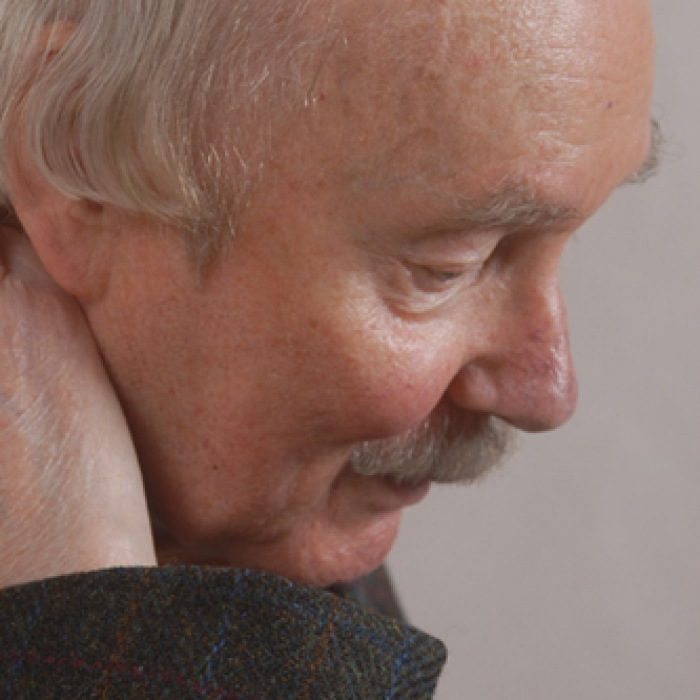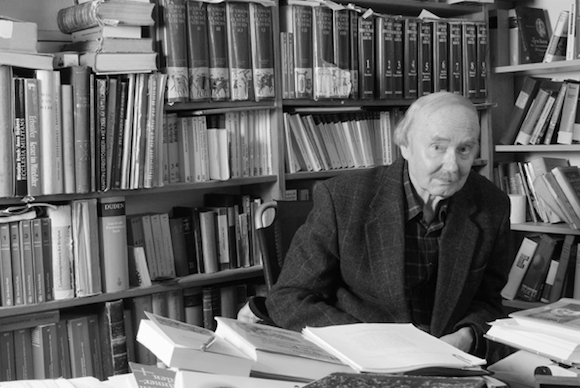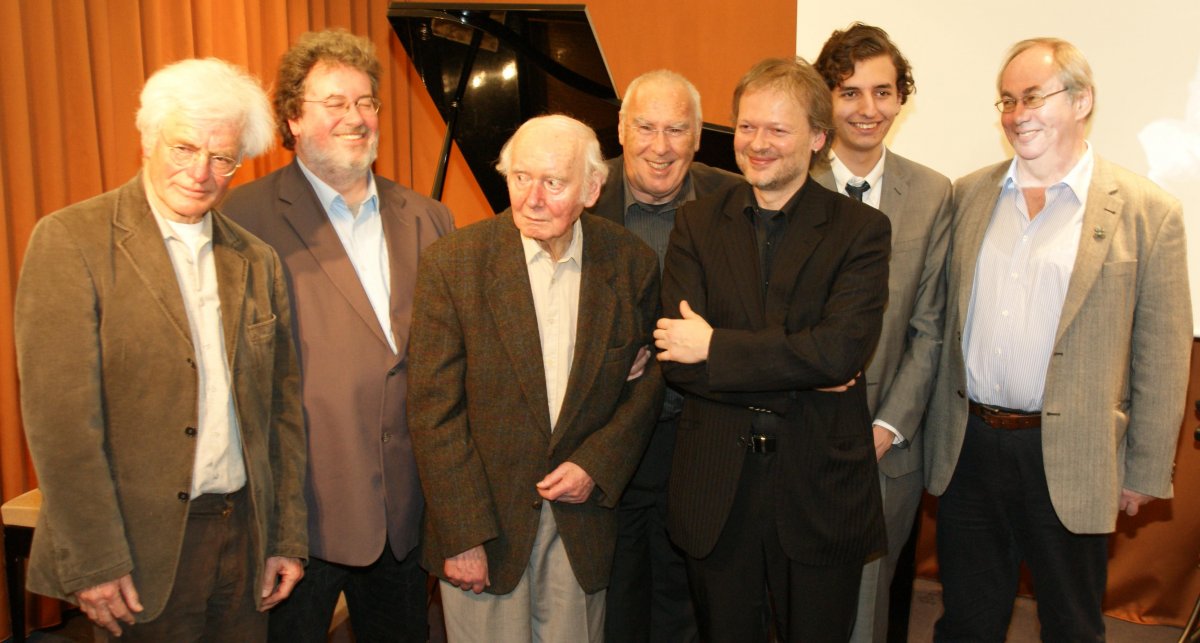A Jewel of Enlightenment
Eulogy for Karlheinz Deschner

deschner_online_2011.jpg
Photo: Evelin Frerk
Karlheinz Deschner is dead. The "greatest church critic of all times" (Dieter Birnbacher) died last Tuesday at the age of 89 in his hometown of Hassfurt. An eulogy by Michael Schmidt-Salomon.
"Enlightenment is a nuisance. He who enlightens the world makes its filth clearer." With this aphorism Karlheinz Deschner described his own life motto. Deschner was the personification of the enlightening nuisance, a sting in the flesh of time, on which the discussion had to ignite again and again.
His first work, the novel "Die Nacht steht um mein Haus", published in 1956, was already a literary sensation, a breathtakingly ruthless book that overwhelms the reader like an avalanche. Helmut Uhlig tried to grasp the uniqueness of this "novel" (rather a piece of radical autobiography) as follows: "Deschner's notes lie beyond suicide, just as Gottfried Bern's later poems lie beyond nihilism ... This book will shock ... In fact, it's nothing more than the medical history of our time." This "medical history of our time", which tells of the brutality of war, of man's contemptuous treatment of his fellow creatures and of nature, was at the same time a medical history of the author, who, threatened by the constant danger of nervous breakdown, treated himself in writing.
The writer's blocks that tortured him before disappeared in one fell swoop. Just one year later, Deschner's famous polemic "Kitsch, Konvention und Kunst" ("Kitsch, Convention and Art") was published, which opened the door to literature for an entire generation and made underrated authors such as Robert Musil known to a broad readership for the first time. In the same year he published the book "Was halten Sie vom Christentum" ("What do you think of Christianity?"), which contained pros and cons of different authors, but no positioning of the editor. Critics misinterpreted this as an expression of a lack of courage, which of course a radical thinker like Karlheinz Deschner could not accept. And so, after the publication of the second novel "Florenz ohne Sonne" ("Florence without the Sun"), he withdrew for several months to study the history of Christianity in detail.

As we know today, this was a real stroke of luck for the secular emancipation movement, because in 1962 "Abermals krähte der Hahn" ("Once again the cock crowed"), the fundamental work of modern church criticism, entered the market. Even though Deschner did not exclusively publish religion-critical books in the following period (for example, another literary controversy appeared with "Talente, Dichter, Dilettanten" ("Talents, Poets, Dilettantes"), a critical history of the USA with "Der Moloch" ("The Moloch"), and a plea for vegetarianism with "Für einen Bissen Fleisch" ("For a bite of meat")), the author was henceforth mainly perceived as a church critic after the sensational success of the "Hahn".
The liberating effect Deschner's religion- and culture-critical writings had, becomes apparent when we take a look at the thousands and thousands of letters the author received over the years. Deschner - like few others - expressed what others might have suspected, but did not dare to formulate. Anyone who had the uneasy, indistinctive feeling that something fundamental was wrong with this religion, this state, this society, this art, found in Karlheinz Deschner someone who succinctly summed it up.
When Deschner celebrated his 60th birthday in 1984, he could look back on a truly impressive body of work - and still, the essentials were yet to come. In 1986, Rowohlt published the first volume of the "Kriminalgeschichte des Christentums" (Criminal History of Christianity). At an age when most people think of retirement, Deschner began writing one of the greatest indictments ever written. More than a quarter of a century later, it was finally accomplished: In the 10 volumes of the "Kriminalgeschichte" with its almost 6000 pages and over 100,000 sources, Deschner has presented a general account of the "Religion of Neighborly Love", that is unmatched in world literature.

The work on the last volume, however, was an ordeal that demanded everything from him. His strength was not sufficient to update the unofficial 11th volume, "Die Politik der Päpste" ("The Politics of Popes"), which describes the developments since the 19th century in more than 1200 pages, which is why I assumed the representation of the second half of the pontificate of John Paul II and Benedict XVI. When we celebrated the "Kriminalgeschichte" completion in Oberwesel in March 2013 and a few weeks later on May 23 celebrated his 89th birthday in Haßfurt, he was already noticeably weakened. His condition worsened dramatically when he had to undergo two surgeries because of an aneurysm. Ultimately, however, the life-threatening rupture of the blood vessels could not be prevented. Karlheinz Deschner died on Tuesday morning at 8.00 a.m. in a clinic in Haßfurt.
Karlheinz once wrote: "Famous people are people you forget a little later." As so often he hit the nail on the head with this phrase. Not even the fame of Ludwig van Beethoven is immortal. Even he - as outrageous as it may seem - will someday be forgotten, like everything Homo sapiens has ever produced. As certain as it is that the work of Karlheinz Deschner will be forgotten at some point: If cultural history and the history of ideas are only halfway above board, this is unlikely to happen in the foreseeable future.
The tremendous literary quality of Deschner's work alone makes it one of the most precious jewels of enlightenment, a jewel that will continue to sparkle in the future to illuminate the world and expose the filth that would otherwise gladly be swept under the carpet again. I am convinced that the enlightenment philosopher Deschner will remain a nuisance for a long time to come. Not only because the subjects he dealt with will remain relevant, but also because writers of his calibre are rare exceptions in the sea of mediocrity that surrounds us.
With his eloquence and powerful language, Karlheinz Deschner eclipsed even Nietzsche. I wouldn't know anyone who could hold a candle to him as a "writer in dispute" or aphorist. It was an incredible privilege to meet him. I greatly valued him - not only as a writer, but also as a person, as a friend. All the more painful is the loss.
The text is released for publication (with reference to the source), the images are excluded.
Image sources:
Photo 2: © Evelin Frerk
Photo 3: © David Farago
The eulogy on the portal of the Humanistische Pressedienstes (hpd - Humanistic Press Service)
